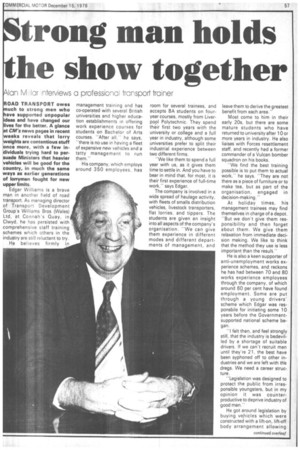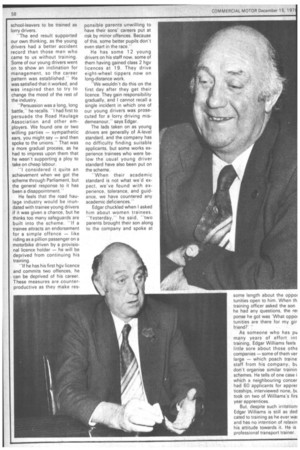Strong man holds the show together
Page 59

Page 60

If you've noticed an error in this article please click here to report it so we can fix it.
Alan IV i ior' interviews a professional transport trainer
ROAD TRANSPORT owes much to strong men who have supported unpopular ideas and have changed our lives for the better. A glance at CM'S news pages in recent weeks reveals that lorry weights are contentious stuff once more, with a few individuals trying hard to persuade Ministers that heavier vehicles will be good for the country, in much the same ways as earlier generations of lorrymen fought for new upper limits.
Edgar Williams is a brave man in another field of road transport. As managing director of Transport Development Group's Williams Bros (Wales) Ltd, at Connah's Quay, in Clwyd, he has persisted with comprehensive staff training schemes which others in the industry are still reluctant to try.
He believes firmly in management training and has co-operated with several British universities and higher education establishments in offering work experience courses for students on Bachelor of Arts courses. "After all," he says, "there is no use in having a fleet of expensive new vehicles and a tatty management to run them."
His company, which employs around 350 employees, has room for several trainees, and accepts BA students on fouryear courses, mostly from Liverpool Polytechnic. They spend their first two years with the university or college and a full year in industry, although some universities prefer to split their industrial experience between two different firms, "We like them to spend a full year with us, as it gives them time to settle in. And you have to bear in mind that, for most, it is their first experience of full-time work," says Edgar.
The company is involved in a wide spread of haulage activity, with fleets of smalls distribution vehicles, livestock transporters, flat lorries, and tippers. The students are given an insight into all aspects of the company's organisation. "We can give them experience in different modes and different departments of management, and leave them to derive the greatest benefit from each area."
Most come to him in their early 20s, but there are some mature students who have returned to university after 10 or more years in industry. He also liaises with Forces resettlement staff, and recently had a former commander of a Vulcan bomber squadron on his books.
"We find the best training possible is to put them to actual work," he says. "They are not there as a piece of furniture or to make tea, but as part of the organisation, engaged in decision-making."
At holiday times, his management trainees may find themselves in charge of a depot. "But we don't give them responsibility and then forget about them. We give them relaxation from immediate decision making. We like to think that the method they use is less important than the result."
He is also a keen supporter of anti-unemployment works experience schemes, and reckons he has had between 70 and 80 works experience employees through the company, of which around 60 per cent have found employment. Some are put through a young drivers' scheme which Edgar was responsbile for initiating some 10 years before the Governmentsupported national scheme began.
"I felt then, and feel strongly still, that the industry is bedevilled by a shortage of suitable drivers. If we can't recruit men until they're 21, the best have been syphoned off to other industries and we are left with the dregs. We need a career structure.
"Legislation was designed to protect the public from irresponsible youngsters, but in my opinion it was counterproductive to deprive industry of good men."
He got around legislation by buying vehicles which were constructed with a lift-on, lift-off body arrangement allowing school-leavers to be trained as lorry drivers.
"The end result supported our own thinking, as the young drivers had a better accident record than those men who came to us without training. Some of our young drivers went on to show an inclination for management, so the career pattern was established." He was satisfied that it worked, and was inspired then to try to change the mood of the rest of the industry.
"Persuasion was a long, long battle," he recalls. "I had first to persuade the Road Haulage Association and other employers. We found one or two willing parties — sympathetic ears, you might say — and then spoke to the unions." That was a more gradual process, as he had to impress upon them that he wasn't supporting a ploy to take on cheap labour.
"I considered it quite an achievement when we got the scheme through Parliament, but the general response to it has been a disappointment."
He feels that the road haulage industry would be inundated with trainee young drivers if it was given a chance, but he thinks too many safeguards are built into the scheme. "If a trainee attracts an endorsement for a simple offence — like riding as a pillion passenger on a motorbike driven by a provisional licence holder — he will be deprived from continuing his training.
"If he has his first hgv licence and commits two offences, he can be deprived of his career. These measures are counterproductive as they make res
ponsible parents unwilling to have their sons' careers put at risk by minor offences. Because of this, some better pupils don't even start in the race."
He has some 12 young drivers on his staff now, some of them having gained class 2 hgv licences at 19. They drive eight-wheel tippers now on long-distance work.
"We wouldn't do this on the first day after they get their licence. They gain responsibility gradually, and I cannot recall a single incident in which one of our young drivers was prosecuted for a lorry driving misdemeanour," says Edgar.
The lads taken on as young drivers are generally of A-level standard, and the company has no difficulty finding suitable applicants, but some works experience trainees who were below the usual young driver standard have also been put on the scheme.
"When their academic standard is not what .we'd expect, we've found with experience, tolerance, and guidance, we have countered any academic deficiences."
Edgar chuckled when I asked him about women trainees. "Yesterday," he said, "two parents brought their son along to the company and spoke at some length about the oppoi tunities open to him. When th training officer asked the son he had any questions, the re! ponse he got was 'What °pool tunities are there for my gir friend?' " As someone who has pi many years of effort int training, Edgar Williams feels little sore about those othe companies — some of them ver large — which poach traine staff from his company, b. don't organise similar trainin schemes. He tells of one case i which a neighbouring concer had 60 applicants for apprer ticeships, interviewed none, Ix took on two of Williams's firs year apprentices.
But, despite such irritation! Edgar Williams is still as ded cated to training as he ever wa! and has no intention of relaxin his attitude towards it. He is professional transport trainer.
















































































































